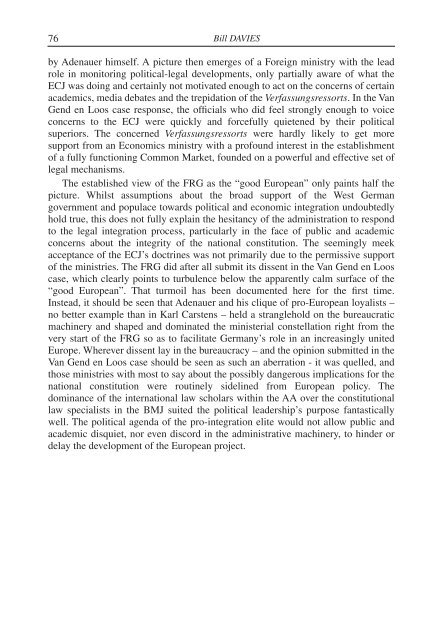2008, Volume 14, N°2 - Centre d'études et de recherches ...
2008, Volume 14, N°2 - Centre d'études et de recherches ...
2008, Volume 14, N°2 - Centre d'études et de recherches ...
Create successful ePaper yourself
Turn your PDF publications into a flip-book with our unique Google optimized e-Paper software.
76<br />
Bill DAVIES<br />
by A<strong>de</strong>nauer himself. A picture then emerges of a Foreign ministry with the lead<br />
role in monitoring political-legal <strong>de</strong>velopments, only partially aware of what the<br />
ECJ was doing and certainly not motivated enough to act on the concerns of certain<br />
aca<strong>de</strong>mics, media <strong>de</strong>bates and the trepidation of the Verfassungsressorts. In the Van<br />
Gend en Loos case response, the officials who did feel strongly enough to voice<br />
concerns to the ECJ were quickly and forcefully qui<strong>et</strong>ened by their political<br />
superiors. The concerned Verfassungsressorts were hardly likely to g<strong>et</strong> more<br />
support from an Economics ministry with a profound interest in the establishment<br />
of a fully functioning Common Mark<strong>et</strong>, foun<strong>de</strong>d on a powerful and effective s<strong>et</strong> of<br />
legal mechanisms.<br />
The established view of the FRG as the “good European” only paints half the<br />
picture. Whilst assumptions about the broad support of the West German<br />
government and populace towards political and economic integration undoubtedly<br />
hold true, this does not fully explain the hesitancy of the administration to respond<br />
to the legal integration process, particularly in the face of public and aca<strong>de</strong>mic<br />
concerns about the integrity of the national constitution. The seemingly meek<br />
acceptance of the ECJ’s doctrines was not primarily due to the permissive support<br />
of the ministries. The FRG did after all submit its dissent in the Van Gend en Loos<br />
case, which clearly points to turbulence below the apparently calm surface of the<br />
“good European”. That turmoil has been documented here for the first time.<br />
Instead, it should be seen that A<strong>de</strong>nauer and his clique of pro-European loyalists –<br />
no b<strong>et</strong>ter example than in Karl Carstens – held a stranglehold on the bureaucratic<br />
machinery and shaped and dominated the ministerial constellation right from the<br />
very start of the FRG so as to facilitate Germany’s role in an increasingly united<br />
Europe. Wherever dissent lay in the bureaucracy – and the opinion submitted in the<br />
Van Gend en Loos case should be seen as such an aberration - it was quelled, and<br />
those ministries with most to say about the possibly dangerous implications for the<br />
national constitution were routinely si<strong>de</strong>lined from European policy. The<br />
dominance of the international law scholars within the AA over the constitutional<br />
law specialists in the BMJ suited the political lea<strong>de</strong>rship’s purpose fantastically<br />
well. The political agenda of the pro-integration elite would not allow public and<br />
aca<strong>de</strong>mic disqui<strong>et</strong>, nor even discord in the administrative machinery, to hin<strong>de</strong>r or<br />
<strong>de</strong>lay the <strong>de</strong>velopment of the European project.

















